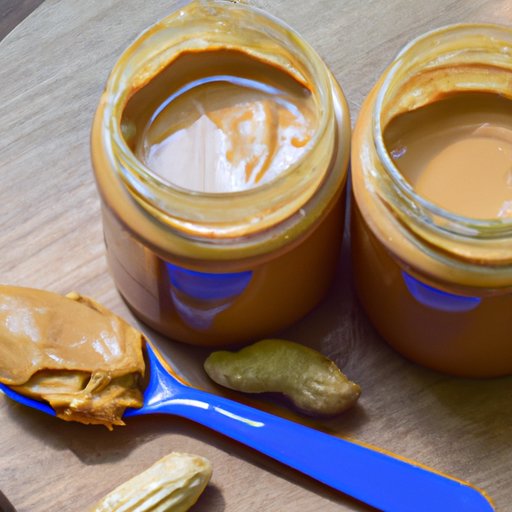Introduction
Peanut butter is a popular condiment that’s made from ground peanuts and other ingredients such as sugar, salt, and oil. It has a creamy texture and can be used for a variety of recipes, from sandwiches to smoothies. But is it healthy? In this article, we’ll explore the benefits and drawbacks of eating peanut butter to help you decide if it should be part of your diet.
Exploring the Benefits and Drawbacks of Eating Peanut Butter
When it comes to the health benefits of eating peanut butter, there are many. Peanut butter is packed with protein, vitamins, minerals, and healthy fats. It also contains antioxidants, which may help protect against disease. Additionally, research suggests that eating peanut butter can help reduce cholesterol levels and lower the risk of heart disease.
However, there are also some drawbacks to eating peanut butter. It’s high in calories and fat, so it can contribute to weight gain if eaten in excess. Additionally, some brands contain added sugars and unhealthy oils, which can increase your risk of chronic diseases. Finally, peanut allergies are common, so it’s important to check labels carefully before consuming peanut butter.

Examining the Nutritional Profile of Peanut Butter
Peanut butter is a nutrient-dense food that provides a range of key nutrients. A two-tablespoon serving contains around 190 calories and 16 grams of fat. It’s also rich in protein (8 grams) and fiber (2 grams). Additionally, it’s an excellent source of vitamins and minerals, including vitamin E, magnesium, phosphorus, and zinc.
Investigating the Link Between Peanut Butter and Weight Loss
Eating peanut butter can be beneficial for weight loss due to its high protein and fiber content. Protein helps keep you full for longer and prevents overeating. Fiber also aids digestion and can help you feel fuller for longer. Additionally, the healthy fats in peanut butter can help boost metabolism and reduce cravings.
However, it’s important to remember that eating too much peanut butter can lead to weight gain. This is because it’s high in calories and fat. So it’s important to limit your intake to one or two tablespoons per day.

Analyzing the Impact of Peanut Butter on Heart Health
Peanut butter can have a positive effect on heart health due to its high content of healthy fats and antioxidants. The monounsaturated and polyunsaturated fats found in peanut butter can help lower bad cholesterol and raise good cholesterol. Additionally, the antioxidants can help protect your cells from damage caused by free radicals.
It’s important to note that peanut butter can also contain unhealthy fats. Some brands contain hydrogenated oils, which can raise your risk of heart disease. So it’s important to read labels carefully and choose a brand that contains only natural ingredients.
Assessing the Role of Peanut Butter in Diabetes Management
Peanut butter can be beneficial for people with diabetes due to its low glycemic index. This means that it won’t cause a sudden spike in blood sugar levels. Additionally, the healthy fats and proteins found in peanut butter can help keep you feeling full for longer, helping you to better manage your appetite.
It’s important to note that some brands of peanut butter contain added sugars, which can raise your blood sugar levels. So it’s important to read labels carefully and choose a brand without added sugar.

Comparing the Health Benefits of Different Types of Peanut Butter
When it comes to choosing the healthiest type of peanut butter, there are several options. Natural peanut butter is a great choice as it contains just one ingredient: peanuts. Reduced-fat peanut butter is also a good option as it contains less fat than regular peanut butter. However, it’s important to note that reduced-fat versions often contain added sugars, so it’s best to read labels carefully.

Investigating the Environmental Impact of Peanut Butter Production
The production of peanut butter can have a negative impact on the environment. Peanut farming requires large amounts of water, pesticides, and energy. Additionally, the transportation and packaging of peanut butter can also contribute to greenhouse gas emissions. So it’s important to consider the environmental impact when choosing a brand of peanut butter.
Conclusion
In conclusion, peanut butter can be a healthy addition to your diet if eaten in moderation. It’s packed with protein, vitamins, minerals, and healthy fats. Additionally, it can help reduce cholesterol levels and aid in weight loss. However, it’s important to read labels carefully to ensure that you’re choosing a brand with natural ingredients and no added sugars. Finally, it’s important to consider the environmental impact of peanut butter production when making your decision.
(Note: Is this article not meeting your expectations? Do you have knowledge or insights to share? Unlock new opportunities and expand your reach by joining our authors team. Click Registration to join us and share your expertise with our readers.)
